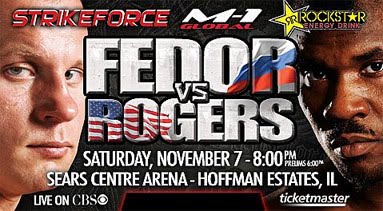M-1 Global's Co-Promotional Strategy Fails to Bring Brand Familiarity
by Leland Roling on Mar 12, 2010 10:01 AM EST in News 137 comments

When the current deal between Strikeforce and M-1 Global was signed as a co-promotional contract that would combine both brands and allow Strikeforce to obtain the services of Fedor Emelianenko, mixed martial arts fans everywhere let out a long sigh of frustration. Many fans have attributed M-1 Global's involvement and Fedor's high demands as the sole reasons why promotions who have worked with the Russia-based organization have fallen into deep financial trouble.
Now, M-1 Global and Fedor Emelianenko are trying to work out a re-negotiation of their contract, a current deal that is only one fight into the obligated three-fight contract. Some of the rumors circulating revolve around the potential for M-1 Global to seek out higher cash payouts while others believe M-1 Global is trying to remove themselves from the contract in order to seek out more lucrative deals in Japan or perhaps the UFC.
M-1 Global Director of Operations Evgeni Kogan spoke with Dave Meltzer at Yahoo! Sports about one snag that M-1 Global may never be able to hurdle over in the re-negotiation:
Kogan allowed that M-1 Global was disappointed in what happened with the promotion of the last fight, but was quick to say the problem wasnít with Strikeforce. He said he was disappointed in media coverage of the event because the M-1 Global name in stories on the show wasnít featured more visibly.
"The way the show was promoted, that was an issue to us, but we donít have an issue with Strikeforce over it," Kogan said. "M-1 isnít a management company for Fedor Emelianenko. We are a fight promotion. We have done matches all over the world, U.S., Asia, Europe, Japan. But the media didnít feature the M-1 name [in coverage of the November show]. Specifically, it wasnít Strikeforceís fault. They honored their agreement. The way the media perceived the event was it was Strikeforce. M-1 wasnít promoted that much. That was an issue with us."
CBS promoted the November show more as "CBS Saturday Night Fights" as opposed to promoting the Strikeforce or M-1 Global brand names. "For us, this is a really big deal," Kogan said. "Weíre concerned about our brand. For us, itís an important piece of the big picture."
This is an issue that I thought about quite a bit following the Rogers vs. Fedor battle back in November. Exactly how much exposure is M-1 Global actually getting from this current deal? If the above image of the Rogers vs. Fedor promotional poster is any indication, M-1 Global isn't receiving much at all. That Rockstar Energy drink logo has more familiarity with fans.
So, who's fault is it? M-1 Global is at fault here. Familiarity is obviously something they are shooting for, but throwing your logo up in front of millions of viewers once every year isn't going to give you any staying power in a casual mixed martial arts fan's memory.
While most fans have a bad taste in their mouth in regards to M-1 Global's shady contract dealings and over-the-top demands, let's look at this from a hypothetical point of view. If M-1 Global was a promotion that produced quality smaller regional shows, had a fairly good reputation in pleasing fighters, and wasn't perceived as a horrible organization, would that even matter in the advertising market of North America?
Probably not. It's no surprise that M-1 Global isn't receiving the exposure they want, and it should be pretty apparent that they'll never receive that kind of attention. Strikeforce has been in the North American market for over 20 years promoting several cards with Showtime over the past few years.
The look and feel of each of the CBS shows screams Strikeforce, something most hardcore MMA fans are familiar with... there's that word again. Are we seeing a trend here?
Kogan is blaming CBS and Showtime for this ordeal, but what did they expect? CBS and Showtime likely want to work with a company that's been established, is known for being rather easy to work with, and doesn't have a reputation of ridiculous demands. M-1 Global is the exact opposite of that statement with the exception that they've been in business for quite some time promoting outside of the United States.
I'm assuming Kogan wants to see something along the lines of "M-1 Global/Strikeforce Presents CBS Saturday Night Fights", but that isn't going to happen. M-1 Global is never going to get the exposure they want in the North American market unless they build a promotion from the ground up and find some sort of television deal for their own organization.
Since it's likely we won't see better exposure for M-1 Global, be ready for a M-1 Global bailout strategy or an attempt to increase payouts for Fedor to compensate. M-1 Global needs to realize that CBS wants to draw in fans, and Strikeforce has more brand recognition than M-1 Global. M-1 simply doesn't keep their name in front of fans enough to allow any casual fan to remember who they are or what they're promoting.